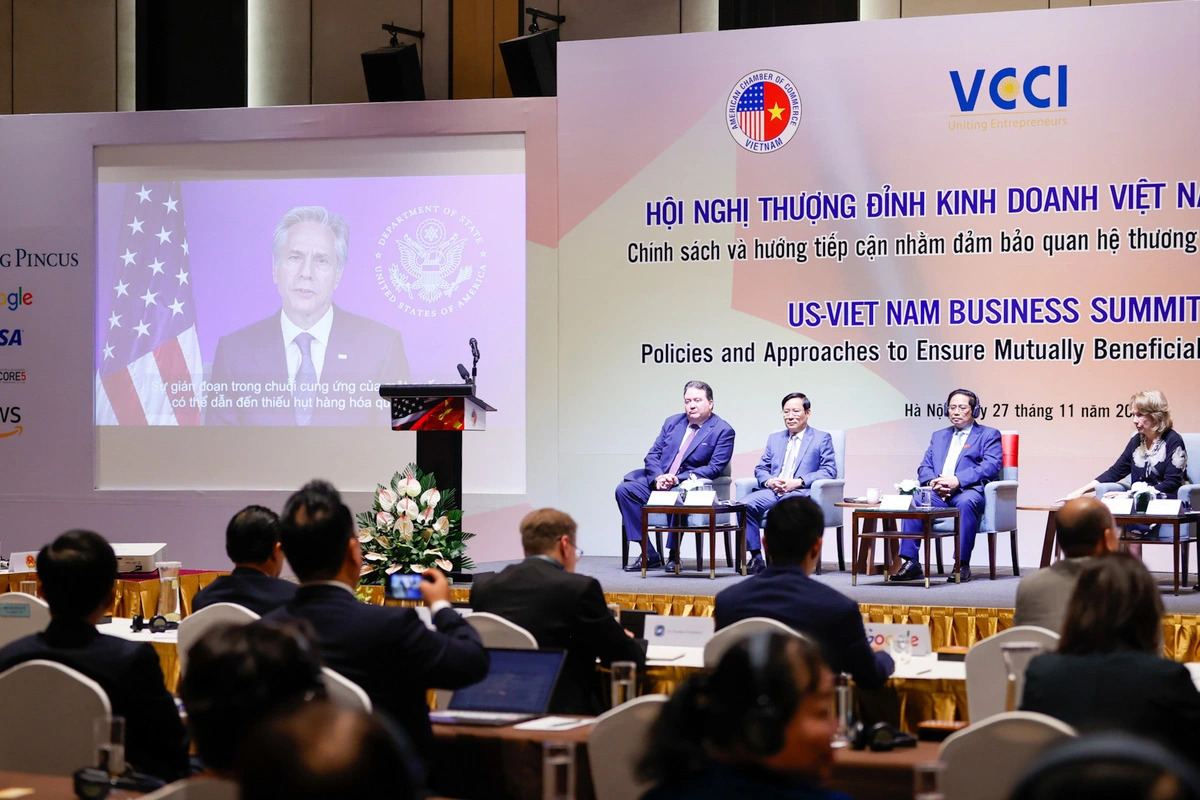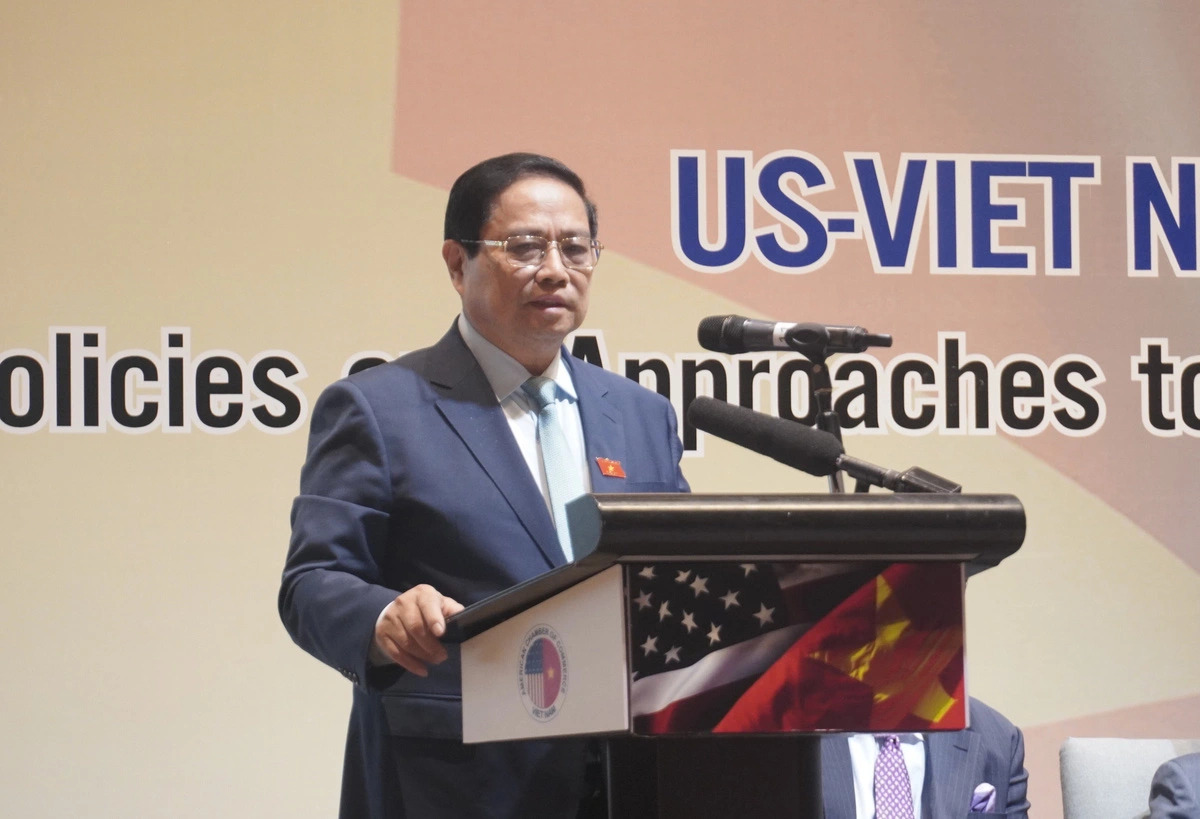As Vietnam plays an increasingly important standing in the Southeast Asian region, it continues to solidify its role as an important U.S. partner, Secretary of State Antony Blinken told the 2024 U.S.-Vietnam Business Summit in Hanoi on Wednesday.
Jointly held by the Vietnam Chamber of Commerce and Industry (VCCI) and the American Chamber of Commerce (AmCham), the event was attended by Vietnamese Prime Minister Pham Minh Chinh, officials from VCCI and AmCham, U.S. Ambassador to Vietnam Marc Knapper, ambassadors from other countries, and business leaders from both countries.
It also featured the virtual participation of U.S. Secretary of State Antony Blinken and former U.S. Trade Representative Michael Froman.
Addressing the summit, Blinken commented that cooperation between the two countries, as well as partnerships between their businesses, is stronger and more dynamic than ever.
The success of these relationships, he said, was on full display during his three recent visits to Vietnam.
He acknowledged Vietnam’s growing importance in the Southeast Asian region and underscored that Vietnam has become an important U.S. partner.
One of Washington's top priorities is to further promote the comprehensive strategic partnership between the two nations, the diplomat affirmed.
Over the past decade, two-way trade between Vietnam and the U.S. has quadrupled, with both having worked together to launch initiatives that benefit their respective communities, Blinken remarked.
According to U.S. Ambassador Knapper, the Vietnam-U.S. partnership is a historical testament to cooperation and development. Last year’s decision to upgrade ties between the two countries has opened a new chapter for bilateral collaboration in a variety of sectors.
Enhancing cooperation and mutual understanding will contribute to helping Vietnam achieve its objectives in high technology, digital economy, green economy, AI, and port infrastructure development, Knapper said.
Speaking at the summit, PM Chinh pledged that Vietnam would continue to improve its investment climate to make it more stable, open, transparent, and in line with international practices, while facilitating investment from the U.S. and other countries.
Vietnam will keep tackling institutional bottlenecks, cutting down on compliance costs, developing digital infrastructure, improving transportation systems, facilitating production, enhancing the competitiveness of goods, and developing a high-quality workforce.
Furthermore, the country will prioritize growth by revitalizing traditional growth drivers such as investment, consumption, and exports.
It will also focus on new growth drivers, including digital economy, green economy, circular economy, science and technology, innovation, digital transformation, AI, cloud computing, the Internet of Things, and blockchain.
|
|
| Vietnamese Prime Minister Pham Minh Chinh speaks at the 2024 U.S.-Vietnam Business Summit in Hanoi, November 27, 2024. Photo: Doan Bac |
He called on American investors to engage in executing larger-scale projects with significant transformative impacts to create breakthroughs in bilateral investment cooperation, including establishing international financial centers, building the North-South high-speed railway, constructing nuclear power plants, expanding airport and seaport systems, implementing clean energy projects, and creating large-scale national data centers.
PM Chinh also suggested that the U.S. remove barriers against Vietnam, recognize its market economy status, and continue to facilitate cooperation between the two countries and their enterprises.
VCCI chairman Pham Tan Cong hoped that the two governments will promote and maintain stable trade relations to achieve a harmonious, sustainable, and mutually beneficial trade balance.
Cong recommended that businesses from both countries promote cooperation, expand partnerships, share information, and develop joint projects, particularly in high technology, digital technology, circular economy, and green energy.
Currently, the U.S. is Vietnam’s second-largest trading partner, with two-way trade reaching US$110.8 billion in 2023 and $110.9 billion in the first 10 months of this year.
As of October, the U.S had about 1,400 FDI projects worth nearly $12 billion in Vietnam, ranking 11th among the 148 countries and territories investing in the Southeast Asian country.
Vietnam and the U.S. normalized their diplomatic relations in July 1995 and entered a comprehensive partnership in July 2013.
Ten years later, the two sides lifted their ties directly to a comprehensive strategic partnership on September 10, 2023, skipping the strategic partnership level, during U.S. President Joe Biden’s official visit to Vietnam.
Like us on Facebook or follow us on Twitter to get the latest news about Vietnam!



















































